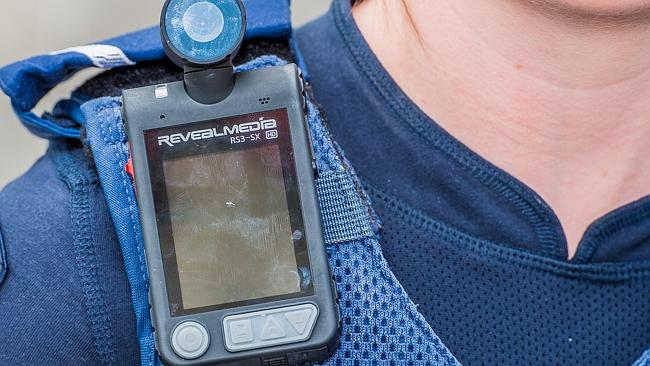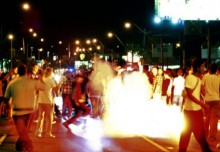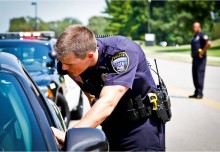Will Body-Worn Cameras actually improve Police Accountability?
Fatal police shootings and deaths in police custody seem to be constant fixtures in American news reports. Protests have spread from Ferguson to New York City to Baltimore in response to the deaths and the perceived lack of police accountability. One frequently touted suggestion to remedy the escalation of police violence in the United States is to mandate body-worn cameras (BWCs) by police. BWC’s have also been trialed in several Australian states and it is timely to consider if and how these these tiny cameras may be used to improve police accountability in Victoria.
BWCs have been used by police departments in England, Scotland and the United States. Since late 2013, Victoria Police trialled body-mounted cameras in Frankston. Thus far, no community consultation or reference group has been established as a part of this trial.
After the final report is released, we would expect Victoria Police to initiate a considerable consultation process with a range of community and legal agencies. If the report and subsequent community consultations are favourable, BWCs could become a standard tool for Victoria Police.
Before these cameras are rolled out across the state, Victorians should consider whether police body cameras are a desirable approach to counter police misconduct. That is, we should ask: Will BWCs actually improve police accountability?
Perceived benefits of BWCs?
- Transparency
Police body cameras are viewed as increasing transparency, and can therefore improve the public’s view of police legitimacy. When used effectively, both the public and the police can rely on video recordings to assist in the resolution of misconduct complaints or proceedings. So long as evidence of police action remains available as part of the public record, people worried about their perceived reliability may feel more inclined to make complaints when suspected misconduct takes place. Police may also take comfort in the fact that unmeritorious complaints will likely decrease with the increased availability of video evidence.
- Improved officer and citizen behaviour
Reductions in both public and police misconduct are another potential benefit of body camera implementation. BWCs are perceived to hold officers accountable, as all of their actions with the public may be recorded. One study found that, as a result of police body cameras, the recorded uses of police force decreased by nearly 60%.[1] Advocates argue that police may be less likely to use excessive force, or any force at all, if they know that their actions can be scrutinised.
Contributing the perceived reductions in incidents of police force is the civilising effect that BWCs have on members of the public. Citizens may be less confrontational with police officers if they know that they are being recorded and that the video can be used against them in court. One Scottish study of BWCs found that assaults on officers fell after implementing body cameras.[2]
Concerns with BWCs?
- Privacy and survellance
Perhaps the primary concern of BWC critics is their effect on privacy. As calls to increase police accountability intensify, many people are advocating that all BWC footage should be available to the public. Critics argue that widespread public disclosure of police body camera videos can invade the privacy of everyday citizens. This public disclosure of police BWC footage has been reported by in a recent New York Times article concerning the practice of the Seattle Police Department to routinely upload edited BWC videos onto YouTube.[3]
Even where police do not purposely place BWC footage on the internet, citizens may still find police videos of themselves appearing online. Leading police body camera manufacturers are turning toward private, profit-driven cloud storage services for video preservation.[4] As security concerns surrounding cloud storage increase, critics warn that cloud storage is not entirely secure.[5]
Not only can BWCs impinge on the privacy of ordinary citizens, but there is a growing concern that these cameras could be used as surveillance tools in themselves. Adding BWC recordings to the growing records of dashboard videos and CCTV footage could allow police unprecedented access into the everyday lives of private citizens. Victoria Police have for some years been using facial recognition software with no regulatory or legislative framework to guide it’s use. Once the data from BWC’s are combined with facial recognition technology, citizens’ rights could be violated on a large scale.
Although police body cameras have the potential to check police power, these tools of accountability could be instruments that invade privacy without adequate regulations.[6]+
- Lack of legislative oversight and regulations
The lack of regulations framing the usage of police body cameras may also present other problems. Even if all officers begin to wear BWCs, without adequate regulations from Parliament there remains the potential for misuse and the expansion of BWC far beyond the stated goals of accountability.
Regulations need to specify when and under what circumstances the cameras should be turned on and off, how and where the video data is to be stored and how and under what circumstances it can be accessed for complaint, disciplinary or legal purposes by both police and the public.
Fears of police selectively using their body cameras may need to be eased by legislative assurances that BWCs will be used in a fair and uniform way.
- Lack of independent research
Finally, critics of police BWCs will be quick to point out that the available research on BWCs is severely lacking. To date, there have only been five studies of police body-mounted cameras worldwide, with only three of them conducted with an independent evaluation.[7] In Dr Michael White’s analysis of the research surrounding BWCs, he found that most of the claims by both advocates and critics remain untested.[8]
Verdict: BWC implementation should not outpace legislative regulations
Despite the push in the United States and elsewhere to get body cameras into the hands of police as quickly as possible, Victorians should be cautious when promoting the widespread use of BWCs in the absence of adequate government regulation.
This technology could help increase transparency and improve police legitimacy. But BWCs also have the potential to impinge on the privacy of both citizens and officers.
Both advocates and critics should agree that more independent research and genuine public consultation is needed to properly weigh up these factors and understand the actual social and legal impacts of BWCs.
Even if the benefits of police body cameras are found to outweigh the detriments, BWCs are not a cure-all for police misconduct. Victorians should continue to advocate for more systemic mechanisms, such as the independent investigations of police complaints,[9] to help ensure police accountability and transparency.
Kaleb Cox,
Melbourne Law School, Public Interest Law Clinic
13 May 2015
[1] Tony Farrar and Barak Ariel, “Self-Awareness To Being Watched And Socially-Desirable Behavior: A Field Experiment On The Effect Of Body-Worn Cameras On Police Use-Of-Force” Police Foundation (2013); see also Randall Stross, “Wearing a Badge, and a Video Camera” New York Times (6 April 2013).
[2] ODS Consulting, “Body Worn Video Projects in Paisley and Aberdeen Self Evaluation”(Glasgow 2011).
[3] Timothy Williams, “Downside of Police Body Cameras: Your Arrest Hits YouTube” New York Times (26 April 2015) <http://www.nytimes.com/2015/04/27/us/downside-of-police-body-cameras-your-arrest-hits-youtube.html?_r=0>.
[4] Ali Winston, “With Evidence.com, Taser Looks to Cash in on Police Brutality Debate” Reveal News (9 May 2015) < http://www.revealnews.org/article/with-evidence-com-taser-looks-to-cash-in-on-police-brutality-debate/>.
[5] “FBI Investigates ‘Cloud’ Celebrity Picture Leaks” BBC News (2 September 2014) < http://www.bbc.com/news/technology-29011850>.
[6] Kathleen Gray, “Policy Body Cams: Bill Would Exempt Footage from FOIA” Detroit Free Press (14 April 2015) <http://www.freep.com/story/news/local/michigan/2015/04/14/emerging-body-camera-technology-prompts-privacy-concerns/25778495/>.
[7] Michael D White 2014. “Police Officer Body-Worn Cameras: Assessing the Evidence” Office of Community Oriented Policing Services (Washington DC, 2014), 16 <https://ojpdiagnosticcenter.org/sites/default/files/spotlight/download/Police%20Officer%20Body-Worn%20Cameras.pdf>.
[8] Michael D White 2014. “Police Officer Body-Worn Cameras: Assessing the Evidence” Office of Community Oriented Policing Services (Washington DC, 2014), 10 <https://ojpdiagnosticcenter.org/sites/default/files/spotlight/download/Police%20Officer%20Body-Worn%20Cameras.pdf>.
[9] See Tamar Hopkins, “An Effective System for Investigating Complaints Against Police” Victoria Law Foundation (2009), 31 <http://www.communitylaw.org.au/flemingtonkensington/cb_pages/files/VLF%20REPORT%20-Effective%20Investigation.pdf>.

The RevealMedia RS3-SX body camera

Photo by Jason Edwards.
Select media and resources
Police union doth protest too much on cam trial, The Age, Editorial 11 June 2012
Frankston Police to Don Crime-Busting Cameras in $25k Trial, Ashley Argoon, Herald Sun 24 December 2013.
Body-Worn Cameras Being Trialled by Tassie Special Operations Group in The Fight Against Crime” Duncan Abey, Mercury, 1 October 2014.
RevealMedia Body Worn Cameras website
Downside of Police Body Cameras: Your Arrest Hits YouTube Timothy Williams, New York Times, 26 April 2015
With Evidence.com, Taser Looks to Cash in on Police Brutality Debate Ali Winston, Reveal News, 9 May 2015
FBI Investigates ‘Cloud’ Celebrity Picture Leaks BBC News, 2 September 2014.
Policy Body Cams: Bill Would Exempt Footage from FOIA” Kathleen Gray, Detroit Free Press, 14 April 2015
Police Officer Body-Worn Cameras: Assessing the Evidence” Office of Community Oriented Policing Services(PDF) (Michael D White 2014.Washington DC, 2014), 16.
Police Officer Body-Worn Cameras: Assessing the Evidence (PDF) Michael D White, Office of Community Oriented Policing Services (Washington DC, 2014), 10.
Implementing a Body Worn Camera Program, Recommendations and Lessons Learnt (PDF), COPS Community Orientated Policing Services, Miller, Lindsay, Jessica Toliver, and Police Executive Research Forum. 2014.




